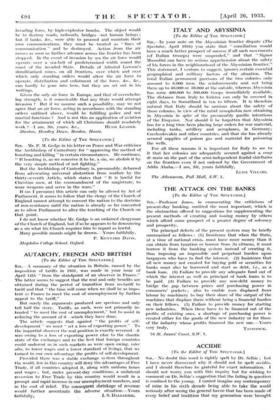AUTARCHY, FRENCH AND BRITISH [To the Editor of THE SPECTATOR.]
SIR,—A summary of the situation in Britain, caused by the imposition of tariffs in 1931, was made in your issue of April 12th " from the standpoint of an observer in France." The latter seems to suggest that the real and only benefits are obtained during the period of transition . from no-tariff to tariff and that the time will come when we shall be as impo- tent as France to meet the cost of unemployment by further appeal to the tariff."
But surely the arguments produced arc specious and only tell half the story. Tariffs, as such, were not primarily in7 tended " to meet the cost of unemployment," but to assist in reducing the amount of it—which they have done.
The article suggests that against " the profits of Felf- development " we must " set a loss of exporting power." To the impartial observer the real position is exactly reversed—it was owing to a loss of exporting power (due to the chaotic state of the exchangei and to the fact that foreign countries could undercut us in such markets as were open owing, inter alia, to lower wages and a lower standard of living), that we turned to our own advantage the profits of self-development.
Provided there was a stable exchange system throughout the world, few in this country will deny the advantages of Free Trade, if all countries adopted it, along with uniform hours and wages ; but, under present-day conditions, a unilateral reversion to Free Trade by this country would result in a prompt and rapid increase in our unemployment numbers, and in the cost of 'relief. The consequent shrinkage of revenue would further accentuate the adverse situation.—Yours










































 Previous page
Previous page